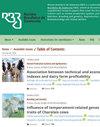pedSimulate – An R package for simulating pedigree, genetic merit, phenotype, and genotype data
IF 1.2
4区 农林科学
Q3 Agricultural and Biological Sciences
Revista Brasileira De Zootecnia-Brazilian Journal of Animal Science
Pub Date : 2022-01-01
DOI:10.37496/rbz5120210131
引用次数: 2
Abstract
- This study aimed to introduce R package pedSimulate, which was built to simulate pedigree, genetic merit, phenotype, and genotype data. These are amongst the most important data types that animal breeders and quantitative geneticists deal with. Twenty pedigrees with ten generations were simulated applying different combinations of three parameters: genetic variance (10 vs. 20), proportion of males selected (10 vs. 20%), and the pattern for selecting females (random, positively, or negatively based on own phenotype or parent average). Males were selected positively based on parent average. Consequently, assortative mating was applied to the pedigrees in which females were positively selected based on their own phenotype or parent average. Disassortative mating was applied to the pedigrees in which females were selected negatively based on phenotype or parent averages. Genetic gain and response to selection over generations were positive for all the pedigrees due to high selection intensity on males, mating each male with multiple females, and moderate to high heritability (0.25 and 0.40 for genetic variances 10 and 20, and the residual variance of 30). Genetic variance showed a slightly increasing trend over generations by assortative mating and lower selection intensity on males. Selection intensity on females was the same in all the pedigrees. This study provided examples of how R package pedSimulate can be adopted for pedigree, genetic merit, phenotype, and genotype data simulation in animal breeding studies. By using different functions and combining different parameters for their arguments, many scenarios can be simulated by R package pedSimulate.一个R软件包,用于模拟系谱,遗传优点,表型和基因型数据
-本研究旨在引入R软件包pedSimulate,该软件包用于模拟系谱、遗传优点、表型和基因型数据。这些是动物育种家和数量遗传学家处理的最重要的数据类型之一。采用遗传变异(10 vs. 20)、雄性选择比例(10 vs. 20%)和雌性选择模式(根据自身表型或亲本平均水平随机选择、正选择或负选择)这三个参数的不同组合,模拟了20个10代的家系。雄性根据亲本平均值正选择。因此,选型交配被应用到谱系中,其中女性是根据自己的表型或亲本平均水平积极选择的。异种交配应用于谱系中,其中女性根据表型或亲本平均水平被消极选择。由于对雄性的高选择强度,每只雄性与多个雌性交配,以及中等至高的遗传力(遗传方差10和20分别为0.25和0.40,残差方差为30),所有家系的遗传增益和选择响应均为正。遗传变异在世代间表现为选择性交配和低选择强度的轻微增加趋势。在所有家系中,对雌性的选择强度相同。本研究提供了如何在动物育种研究中使用R软件包pedSimulate进行系谱、遗传优点、表型和基因型数据模拟的示例。通过使用不同的函数和组合不同的参数作为它们的实参,R包pedSimulate可以模拟许多场景。
本文章由计算机程序翻译,如有差异,请以英文原文为准。
求助全文
约1分钟内获得全文
求助全文
来源期刊
CiteScore
1.90
自引率
0.00%
发文量
25
审稿时长
8 weeks
期刊介绍:
The Revista Brasileira de Zootecnia (RBZ; Brazilian Journal of Animal Science) encompasses all fields of Animal Science Research. The RBZ publishes original scientific articles in the areas of Aquaculture, Biometeorology and Animal Welfare, Forage Crops and Grasslands, Animal and Forage Plants Breeding and Genetics, Animal Reproduction, Ruminant and Non-Ruminant Nutrition, and Animal Production Systems and Agribusiness.

 求助内容:
求助内容: 应助结果提醒方式:
应助结果提醒方式:


